December 13, 2023
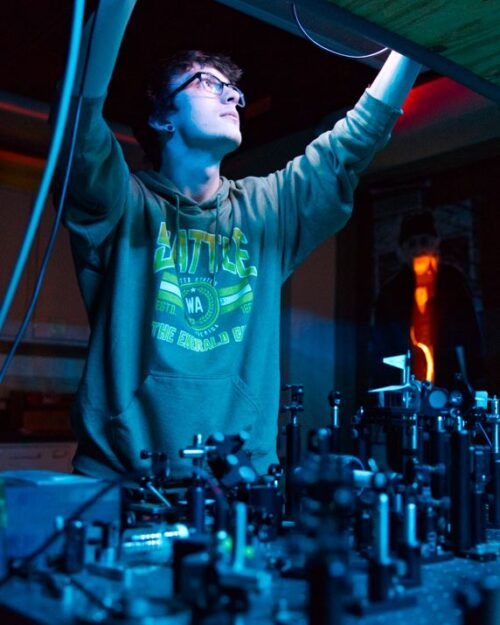
Empowering STEM Futures: Insights from Muhammed Khan and Reese Tyra on AEOP Internships
AEOP Internships are open to high school and undergraduate students, and we got to talk to Muhammed Khan and Reese Tyra from Oxford, Ohio about their experiences! Muhammed is a senior at Talawanda High School, and Reese is graduating in December from Miami University, both now uniquely qualified through their AEOP experiences. Read on to learn more about their research, what it meant to win the AEOP Travel Award, and what they’ve learned throughout their AEOP journeys.
What is your academic background?
Reese: I am double majoring in physics and music composition and performance, and I’ll graduate in December 2023! I first started working in a physics lab in the fall of 2021. I want to go to grad school after this.
Muhammed: I’ll graduate high school in May 2024, and my plan is to go to college and major in a field of engineering, likely either mechanical or electrical. I may also pursue applied physics! Whichever major I end up studying, I want to continue doing important research in college.
When did you first get involved with AEOP? What made you decide to participate in AEOP?
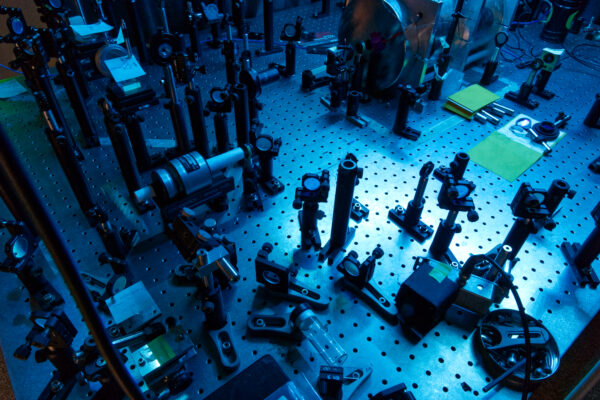
Reese: It was all thanks to my advisor, Dr. Samir Bali. He’s always wanted undergraduate students in his lab, which was a great opportunity for me. I spent an entire summer with Dr. Bali doing everything from cleaning optical equipment to learning how to use function generators. I learned a lot from the graduate students around me.
Muhammed: Similar to Reese, I participated in the internship program for high schoolers in the summers of 2022 and 2023. I also worked under Dr. Samir Bali.
What was it like presenting at the Frontiers in Optics + Laser Science conference? What was the significance of the experience for you?
Reese: This past conference was my second time attending, but this year I got to give a talk. Dr. Hal Metcalf from Stony Brook and Dr. Samir Bali Miami University organized an amazing Undergraduate Symposium. With the additional knowledge and extra perspective of research going on in the field this year compared to last, I got to have great conversations with other undergraduates.
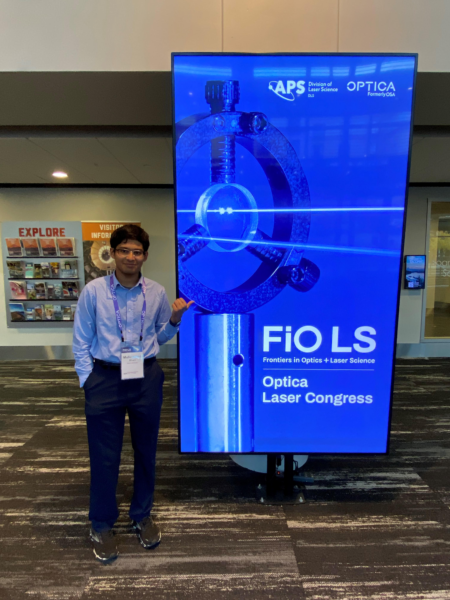 Muhammed: Presenting at the FiO/LS conference was undoubtedly one of the most fruitful experiences I have had in high school; thanks to the mentorship of Dr. Bali, Reese and Benny Makias, I presented a poster during an undergraduate symposium. I was also able to have meaningful discussions about my work with students from around the country, and I gained a new appreciation for the wide variety of work that is done in the field of optical physics. I also had the opportunity to hear professors from various universities speak about their work, and to attend an exhibition featuring top optics companies. Overall, attending the FiO+LS exposed me to a network of incredible, dedicated researchers who are working to make a major difference in the world. It was an amazing experience that furthered my appreciation for STEM and gave me a strong foundation in the world of scientific research.
Muhammed: Presenting at the FiO/LS conference was undoubtedly one of the most fruitful experiences I have had in high school; thanks to the mentorship of Dr. Bali, Reese and Benny Makias, I presented a poster during an undergraduate symposium. I was also able to have meaningful discussions about my work with students from around the country, and I gained a new appreciation for the wide variety of work that is done in the field of optical physics. I also had the opportunity to hear professors from various universities speak about their work, and to attend an exhibition featuring top optics companies. Overall, attending the FiO+LS exposed me to a network of incredible, dedicated researchers who are working to make a major difference in the world. It was an amazing experience that furthered my appreciation for STEM and gave me a strong foundation in the world of scientific research.
What was the research you presented on? How did AEOP support your research?
Reese: I presented on experimental work where we investigate a phenomena called electromagnetically induced transparency (EIT), or light causing transparency. This quantum mechanical effect is very exciting to work with! We’re essentially slowing down light. Consider that the speed of light is about 300,000 meters per second – by sending light through our vapor cell, or warm alkali vapor, we’ve been able to slow down light to 1,200 meters per second. I’ve been working in the lab on supplementing data from past experiments with the end goal of turning the experiment into a paper. The motivation of working on optical quantum memory, or light storing quantum energy, is to one day help build quantum computers. The way I see it, there are two ways to motivate physics research: you can discover new physics, or you can apply existing physics in new ways. This research helps open more algorithms for quantum computing.
AEOP fully funded my travel through the AEOP Travel Symposium award, and I’m very grateful. One non-traditional way AEOP has funded my learning experience was by working as an intern and earning an income; because of that, I was able to attend a two week camp at a Paramount recording studio in L.A. Because of my music degree, I typically engage with the music profession in an academic context. Being able to take a step back and observe the industry from a different lens was an immense relief for me. I dare say it was what I needed to enjoy music like a normal person again!
Muhammed: The research that our group does involves the development of quantum memory in atomic vapor. We shine two lasers, one called the pump and the other called the probe, on atoms. When we shine both lasers together, the probability amplitudes of their absorption destructively interfere, reducing the absorption of the probe laser. This lets us slow down and store the probe laser pulses in the atoms. We are using different spatial beam profiles, such as Bessel and Laguerre-Gaussian, to investigate which type of light pulses can be stored with best fidelity. My poster at the conference focused on the Laguerre-Gaussian beam profile!
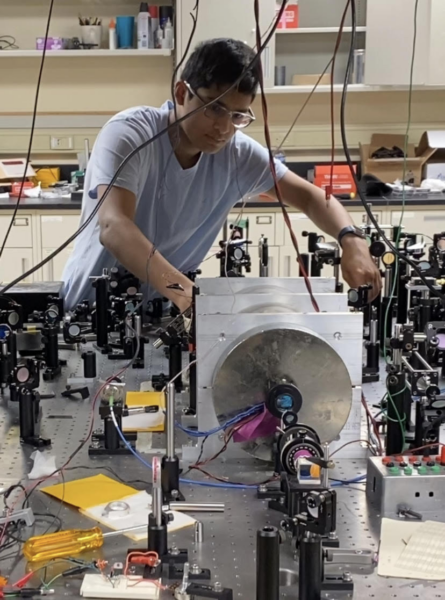
Working with AEOP was what allowed me to become involved in this research, as it gave me a formal position in Dr. Bali’s lab. The AEOP funds provided us with some lab supplies that were critical to our experiment and also paid for my travel expenses to present a poster at FiO+LS.
Muhammed, what’s it like being a high school student working in undergraduate spaces?
At first, working with college students seemed pretty daunting, but I’ve had a great experience. The students that I work with are very easy to get along with. They are also always open to answering questions that I may have about the experimental setup or the physics behind it. It has given me a good idea of what doing research as a college student would be like!
What is a favorite memory you have from your AEOP experience?
Reese: I’ve lived with two roommates who were in the lab with me! We bonded over hypothesizing solutions to the challenges our team was facing. One time, I was having a very specific challenge, and I looked to Dr.Bali for help. He provided me with a research paper and had me figure it out myself. In research labs, often the job is predetermined for you as an undergrad, but this was an opportunity to forage for information and figure it out myself. Undergraduate research has allowed me to build rapport and gradually take on a higher standard for success, approaching that of graduate research. In this case, I guessed the source of some absorption we were seeing, but didn’t have the background or know-how to say for sure. But the investigation itself became the experience I learned from the most, and my thought was correct.
What are your future goals or aspirations?
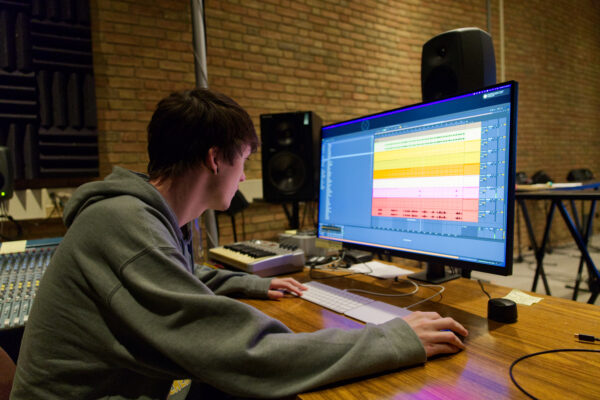 Reese: I think it’s okay to leave a little room for uncertainty. I have so far pursued music and physics equally in academia, but in transitioning to a graduate program I have the opportunity to again take a step back from the music side of things. I think it will be refreshing to let my passion for music evolve naturally while having all the time I need to give research the dedication it deserves.
Reese: I think it’s okay to leave a little room for uncertainty. I have so far pursued music and physics equally in academia, but in transitioning to a graduate program I have the opportunity to again take a step back from the music side of things. I think it will be refreshing to let my passion for music evolve naturally while having all the time I need to give research the dedication it deserves.
Muhammed: I plan to study engineering in college. To be honest, I’m not exactly sure where that’s going to take me. My main goal is to find work that is not only enjoyable, but also allows me to make a major difference in the world.
What is one lesson or take away you have from your AEOP experience?
Reese: Lessons are learned when times are hard, and that’s okay. What I’ve learned is that you have to generate knowledge for people to take you seriously. You need to have a strong understanding of the material, and then you forge ahead. At conferences you learn how to talk to scientists and researchers with deep expertise, and you learn that you can say anything you want – as long as it’s the truth. Also, I think as an undergrad it’s especially important to see firsthand the power of a name, and what it means to put yours next to scientific results: their quality represents the value of your work. You get to take ownership.
Muhammed: It’s important to take small steps to reach your goals in STEM. It took time for me to familiarize myself with the many intricacies of our research. Even the experiment itself must be completed one small step at a time.
What are some words of advice you have for fellow students interested in AEOP in general?
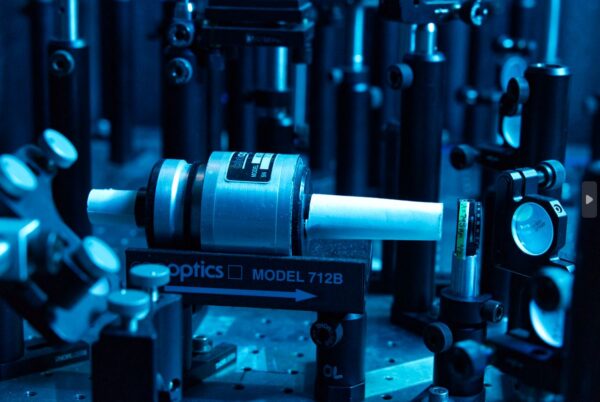 Reese: If you have the opportunity to travel, take it! If you have the opportunity to get information, take it! It’s ok to learn you don’t like working in a lab, but getting into a lab in the first place is the only way to tell if you like something or not. And do a variety of research if you can! This the kind of experience where you really don’t know until you try. Try to get new perspectives and learn how to adapt to new scenarios within the world of research.
Reese: If you have the opportunity to travel, take it! If you have the opportunity to get information, take it! It’s ok to learn you don’t like working in a lab, but getting into a lab in the first place is the only way to tell if you like something or not. And do a variety of research if you can! This the kind of experience where you really don’t know until you try. Try to get new perspectives and learn how to adapt to new scenarios within the world of research.
And get in early, ask lots of questions, read the relevant papers and take notes. Make sure you label everything if you put it away, and be careful you aren’t throwing out anything expensive!
Muhammed: My biggest piece of advice is to never be afraid to ask questions. It’s important to realize that it’s unlikely you will succeed if you don’t truly understand what you’re doing. Having a meaningful discussion about a concept you are confused about will not only benefit you, but also the person who is explaining it to you.
Is there anything else you’d like to share?
Reese: There’s an overlap between music and physics. Creative problem solving is super essential in making artistic decisions as well as forging new paths in physics. Finding new ideas is always creative, whether in the lab or in the studio.
Muhammed: I’d like to thank AEOP once again for their generous funding. If you are a high schooler who is thinking about applying to the AEOP, I would absolutely recommend doing it! Getting hands-on experience by working in a lab during high school is an incredible way to prepare yourself for a future in STEM. Don’t be afraid to approach professors on your own, either at a nearby university or remotely.
To learn more about AEOP’s Internships, visit here.
Find a Volunteering Opportunity
Visit our Program Volunteers page for a tool to find the best opportunity for you.
